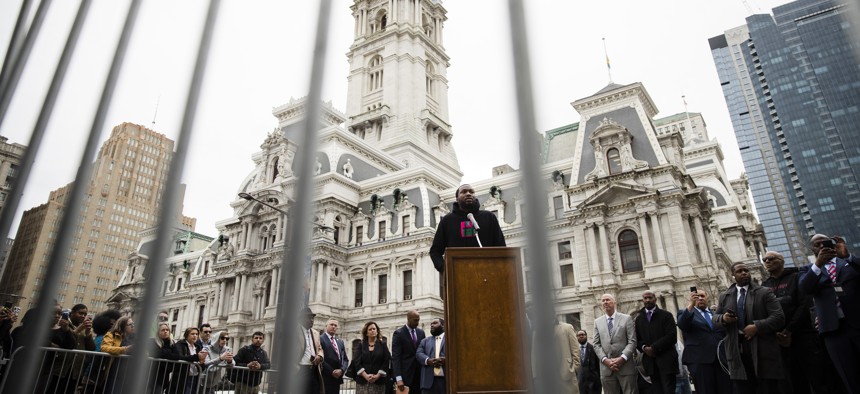Parole and Probation Violations Are Filling State Prisons

Rapper Meek Mill speaks in favor of changing Pennsylvania’s probation system in April. In 2017, Mill served five months for violating probation in a nearly decade-old gun and drug case. Matt Rourke/AP Photo

Connecting state and local government leaders
A new report from the Council of State Governments shows that many minor violations of parole or probation come with a high price tag, as they often lead to people ending up back in prison.
In recent years, 77% of the state prison admissions in Missouri were due to people violating parole or probation, often for minor slip-ups. That means that if someone misses an appointment with their supervising officer, fails a drug test, or doesn’t pay a court-ordered fine, they could end up behind bars.
The 16,715 people incarcerated on technicalities put a strain on Missouri’s system, which Department of Corrections Director Anne Precythe said left two obvious paths: building two new prisons with a price tag over $200 million, or reform. The state chose the latter.
“We had to change our practices,” Precythe said. So in 2018, the state started implementing a bevy of new ideas, including providing improved treatment for mental health and substance abuse problems, implementing risk assessment tools, creating a behavior matrix with incentives and consequences, and changing their community supervision policies.
Precythe said her experience is reflected in a new report by the Council of State Governments, which analyzes parole and probation violations from 2012 to 2017. “This report validates the direction the State of Missouri has taken [to reduce] technical violations and revocations to prison,” she said.
The report provides a nationwide and state-by-state look at the number of parole and probation violations within state prisons. Overall, 45% of prison admissions were a result of violations, either for new offenses or for failure to fulfill a requirement of the supervision agreement. In 20 states, that number was above 50%. Utah had the highest percentage, at 79%, followed by Missouri at 77%, then Wisconsin at 70%, and Idaho at 69%. Only Arkansas and Massachusetts attributed less than 20% of admissions to violations.
The numbers were even more jarring for technical violations, which are usually minor. On a given day, approximately 95,000 people nationwide were incarcerated due to technical violations, costing states $2.8 billion annually. Technical violations accounted for 25% of all prison admissions, and in five states—Kentucky, South Dakota, Kansas, Missouri, and Utah—they made up more than half.
“No one thinks people should be sent to prison for a missed curfew or faulty paperwork—and yet this report shows these kinds of minor technical violations are contributing significantly to state prison populations," said Juliene James, director of criminal justice for Arnold Ventures, which funded the analysis.
In Pennsylvania, 54% of prison admissions were for supervision violations, with half of those resulting from technicalities. John Wetzel, the secretary of the Pennsylvania Department of Corrections, called the consequences of these admissions “devastating.” He said that the report should be a wake up call for state legislators, corrections departments, and the general public.
“As a taxpayer, when you see Pennsylvania is spending $100 million on parole violations, you should question that,” he said. “If we needed to spend $100 million to keep the public safe, we would, but jailing people for technical violations leads to further crime, because that severes people’s personal and social supports and eliminates their ability to have gainful employment.”
States have taken various strategies to address the number of people on parole or probation who have been caught in the revolving door leading back to prison. Initiatives have included reducing parole and probation sentence lengths, creating caps for returns on technical violations, limiting supervision rules, shortening sentences for good behavior, and reducing fines.
But while data shows that each state has seen varying degrees of success with their efforts, director of the CSG Justice Center Megan Quattlebaum said the report isn’t meant to rank states. “The data doesn’t have the nuance or depth to give gold stars or demerits,” she said.
One thing that states struggle with across the board is the particularly tricky issue of violations due to drug use or possession. Wetzel said that Pennsylvania Gov. Tom Wolf’s declaration of a state of emergency around opioids has allowed the Department of Corrections to work more closely with other state agencies. “We’re now partnering with the Department of Drugs and Alcohol to try treatment in the community, so that people who do heroin don’t end up in prison,” he said.
Pennsylvania is also experimenting with three different types of medication-assisted treatment in its prisons, with a special focus on people whose sentences are less than a year. The aim is to make sure that they can overcome their addiction before they get out. Missouri, by contrast, started the Justice Reinvestment Initiative, which provides people on parole and probation with mental health and substance abuse treatment, along with wraparound services including employment coaches, peer support, and housing assistance.
The heads of these corrections departments agree: the answer is not more beds. “The system, both prisons and supervision, has grown to have such a huge footprint, and the financial toll is unmatched,” said Wetzel. “And the most significant impacts are felt by poor communities, and communities of color.”
But Precythe said that data will be instrumental in helping states turn the situation around. Quattlebaum said she hopes states will take a close look at the data, and revisit the idea that probation and parole are meant to help people avoid incarceration. “Instead, in many cases we’re seeing the opposite effect. Many states have made recidivism reduction a public safety priority, but the harsh reality is that supervision fails nearly as often as it succeeds."
Emma Coleman is the assistant editor for Route Fifty.

NEXT STORY: Detaining Refugee Children at Military Bases May Sound Un-America, But It's Been Done Before





